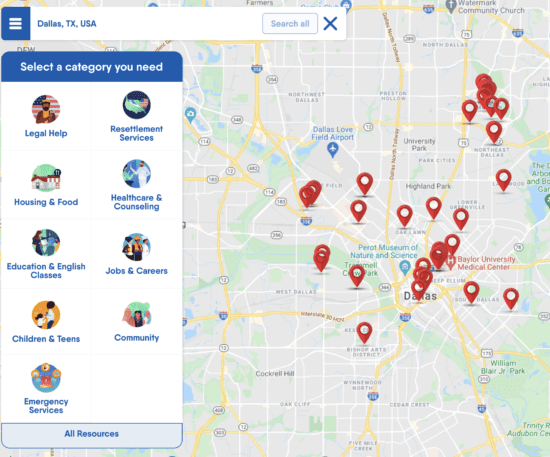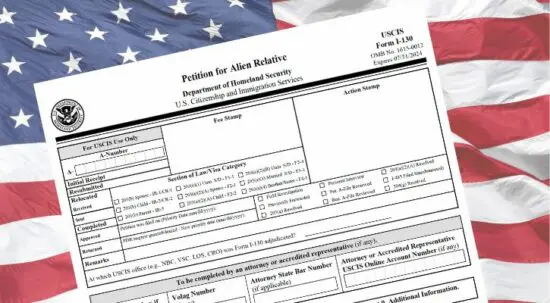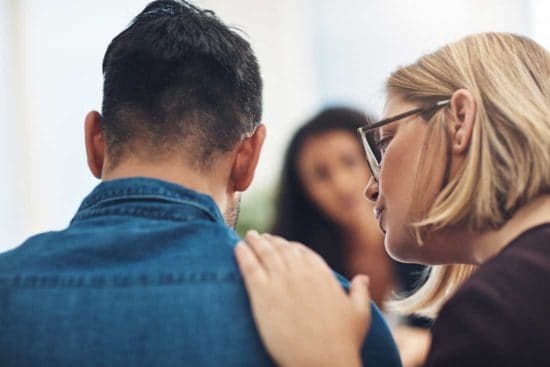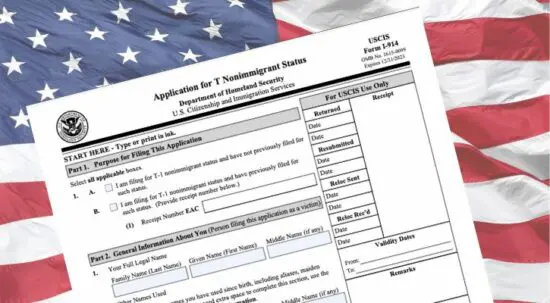The U.S. government offers immigration protection for certain victims through the U.S. Citizenship and Immigration Services (USCIS). U visa is for victims of serious crimes and T visa is for victims of human trafficking.
What is a U visa?
U visas (also called U nonimmigrant status) are for victims of serious crimes who have suffered substantial mental or physical abuse. Serious criminal activity for this includes:
- Abduction or kidnapping
- Rape or sexual assault
- Forced prostitution
- Blackmail or extortion
- Domestic violence
- Forced labor
- Hate crimes
- Torture
People with U visas get nonimmigrant status for 4 years. Nonimmigrant status means it is temporary. They may be able to get a Green Card to stay in the United States if they meet certain requirements.
U-Visa holders can:
- Stay in the USA for up to 4 years
- Work legally in the U.S.
- Avoid detention and deportation
- Request legal status for family
- Apply for a Green Card to stay permanently if requirements are met
| U visas are still available under the current U.S. government. You can apply for a U visa and continue to receive U visa benefits. If you have questions, talk to an immigration lawyer. |
Who can apply?
You can apply for a U visa if you meet each of the following requirements:
- You are a victim of a serious crime.
- You suffered serious physical or mental abuse.
- The crime happened in the USA or the criminal activity violates U.S. laws.
- You have information about the crime.
- You helped or are willing to help law enforcement in their investigation.
- You meet U.S. admissibility requirements or have a waiver. You might be inadmissible if you have committed certain crimes or pose a threat to the public. If you do not meet admissibility requirements you may still be eligible to apply if you have a Form I-192. A legal representative can help you with this.
If you are under 16 or you cannot provide information due to a disability, someone you trust may provide details about the crime.
How do I apply?
You apply for a U visa through USCIS. It does not cost anything to apply. You will need to:
- Complete Form I-918.
- Provide evidence you have been a victim of a serious crime.
- Provide evidence that you have suffered mental or physical abuse.
- Get a certification from law enforcement with Form I-918, Supplement B that states you are helping their investigation.
- Include a personal statement about your experience.
- Complete Form I-765 to apply for work authorization to submit with your application.
You will mail your forms to either the USCIS Nebraska or Vermont Service Center depending on your state.
| It is important to get legal advice. A lawyer or accredited representative can help you find out if you qualify and complete your application. |
When you apply you will need to collect evidence to show that you meet the requirements. One part of this is a certification from law enforcement.
The other part is that you have to show that you have serious mental or physical abuse. Examples of this supporting evidence could be:
- Medical documents
- A statement from a therapist
- Legal paperwork
- Letters from social services
- Letters from family or friends who know about your situation
Your application will also include a personal statement, also called an affidavit. This is your chance to tell your story and explain what happened in your own words. Include information in your statement that shows how you meet the requirements. If you are missing other documentation, you can explain why in your statement.
Yes, you may include certain family members in your application:
- If you are 21 or older, you can include your spouse and children under 21.
- If you are under 21, you can include your spouse, children under 21, parents, and unmarried siblings who are under 18.
You must file Form I-918, Supplement A for family members. If approved, your family members will receive a derivative U visa. You can file this at the same time as your application or at a later time.
In some cases, your family members may be considered indirect victims. If so, they can apply for a U visa as the main applicant. A legal representative can help you choose the best option.
After you file your application you will receive a receipt notice. This notice will have information you will need to be able to check the status of your case.
USCIS will review your application and may ask for more information. You may be scheduled for a biometrics appointment to provide a photograph, fingerprints, and your signature.
You will get a decision in the mail.
Currently, the average processing time for U visa cases is 3 years.
You may be eligible for some benefits while you wait. This can be deferred action or parole to protect you from deportation and allow you to work. You can get these benefits in 2 ways:
- Waiting list. There is a limit on the number of U visas available to primary applicants each year. If the cap has been reached, you will be put on a waiting list while you wait for a final decision and a visa.
- Bona Fide Determination. In some cases, USCIS will do a basic review to make sure your application is complete and do a background check. If this passes, they will give you a bona fide determination.
Each case is different, and some may take more or less time to complete. You can track the status of your case online or send questions to the USCIS Nebraska or Vermont Service Center.
If your U visa petition is denied you will have the same immigration status you had when you applied. However, you may be able to appeal your decision.
You might also qualify for other forms of protection including VAWA, temporary protected status, or other humanitarian programs. Contact an immigration attorney or accredited representative to review your options.
If you have a pending application, it is very important to talk to a legal representative to find out if you can safely travel abroad. If you leave the country while your application is pending, you may not be allowed to return. Leaving the country could also put your case at risk.
Once you have an approved U visa, you can apply for advanced parole to travel outside of the USA. It is important to know that any time you leave the country with a temporary visa, you risk being denied reentry. Travel outside of the USA may also create problems for your Green Card application. A legal representative can provide more guidance.
You may be eligible for benefits if you live in certain states. U-visa holders do not receive federal benefits. Some states, including California, provide state-funded benefits like food and income support. The rules are different in each state.
You can go to your local Department of Health and Human Services to learn more.
U visas are only valid for 4 years. If you do not adjust your status or renew your visa before it expires, you will have the same immigration status you had before getting your U visa.
You are encouraged to apply for a Green Card before your status expires. If you do not apply for a Green Card, you may be able to extend your U visa status in certain situations by filing Form I-539.
Qualifying reasons for a U visa extension include:
- Exceptional circumstances
- Request from law enforcement
- Delays in consular processing
- Pending Green Card application
You may still face immigration enforcement even if you have applied for or been approved for a U visa.
- Always carry your immigration documents and proof of two years of residence. Make sure you have copies of your receipt, bona fide determination, approval notices, and work permit on you.
- Save the contact information for the advocate and lawyer involved in your case.
- Be prepared for ICE. Learn what to do if immigration officers stop you. Know your rights and how to create a safety plan.
Work permit
You can apply for a work permit at the same time you apply for a U visa. A work permit is also called an Employment Authorization Document (EAD). An EAD shows employers that you are allowed to work in the USA.
To apply you will submit Form I-765 at the same time you send your Form I-914. For family members, you will send this in with Form I-914, Supplement A.
If you already filed your U visa petition and did not include this form, you can submit it later.
If you are on the waiting list or receive a bona fide determination for your U visa you may get work authorization while your case is pending. If you did not complete Form I-765 with your initial U visa application, you can file Form I-765 after getting notice from USCIS.
Green Card
If you are approved for a U visa, you can apply for lawful permanent residence and get a Green Card. In most cases, you must have lived in the USA for 3 continuous years and meet other requirements.
To apply for a Green Card you will need to file Form I-485. Learn about the requirements and process for a U-visa holder.
If approved for a Green Card, you may be eligible to apply for citizenship after 5 years.
Your safety
USCIS will keep all your information confidential. They will not share your information without your permission except in rare cases.
If you do not feel safe getting mail at your home, you can get a safe address you can use on applications.
Many undocumented immigrants worry that if they report a crime, they may be deported. The U visa program is there to help people who are victims of crimes and make it safer to report them. You are not required to have legal immigration status to apply for a U visa.
Find help and support
Legal Help
It is important to get legal advice as you consider your options. A lawyer or accredited representative can help you find out if you qualify and complete your application. Many organizations and lawyers offer free or low-cost legal help.
Domestic violence help
Call the National Domestic Violence Hotline at 800-799-7233 or text START to 88788. You can speak to a person 24 hours a day, 7 days a week. Interpreters are available in over 140 languages.
Your abuser may check where you go on the internet. Be sure to regularly clear your browser history or use a safe device like a friend’s phone or public library computer. Learn more about getting help for domestic violence.
Call 911 if you are ever in immediate danger.
Emotional support
Survivors of serious crimes may experience trauma, leading to sadness or depression. Getting mental health support can help you feel better. Learn more about trauma and where to find help.

Find legal help, English classes, health clinics, housing support, and more. Search a local map and list of services for immigrants in the USA with the app FindHello.
The information on this page comes from USCIS, WomensLaw.org, and other trusted sources. We aim to offer easy to understand information that is updated regularly. This information is not legal advice.





